A Fun Hardboiled Ride with Classic Barron Horror: The Wind Began to Howl by Laird Barron
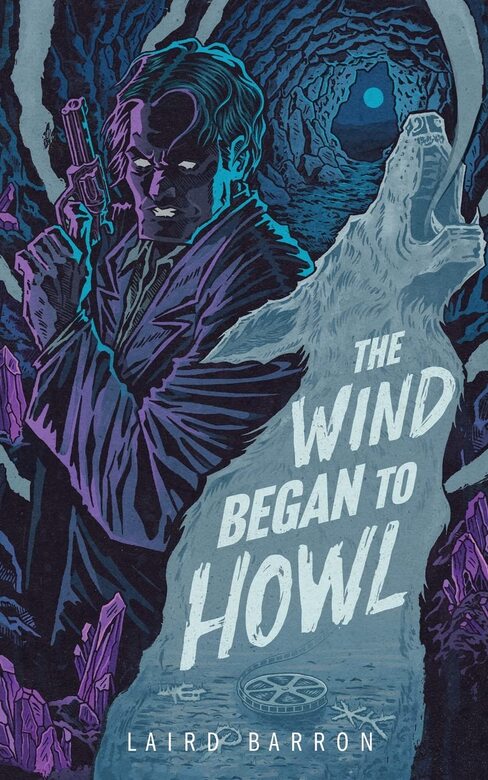 |
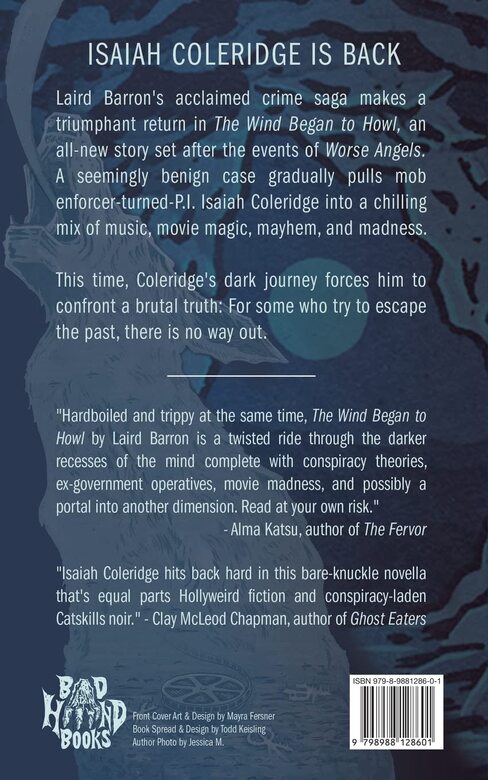 |
The Wind Began to Howl (Bad Hand Books, May 16, 2023). Cover by Mayra Fersner
Laird Barron has been one of most exciting authors and one of the freshest voices in horror literature for several years now. His amazing short story collections include The Imago Sequence (2007), Occultation and Other Stories (2010), The Beautiful Thing That Awaits Us All and Other Stories (2013), as well as novels such as The Light Is the Darkness (2012) and the incredibly creepy The Croning (2012). Barron’s output has been prolific and consistently excellent.
However, like many genre writers, I am sure that Barron has sometimes wanted to break out of being “typecast.” And in 2018 that became a possibility when he released his first hardboiled detective novel Blood Standard with major New York publisher Putnam. This was Barron’s first novel about Isaiah Coleridge, an ex-mob enforcer turned private detective.
[Click the images for howlin’ versions.]
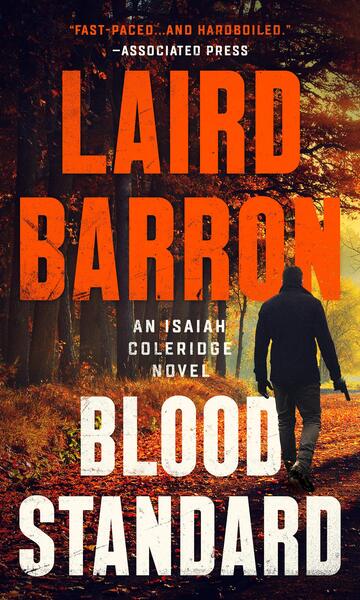 |
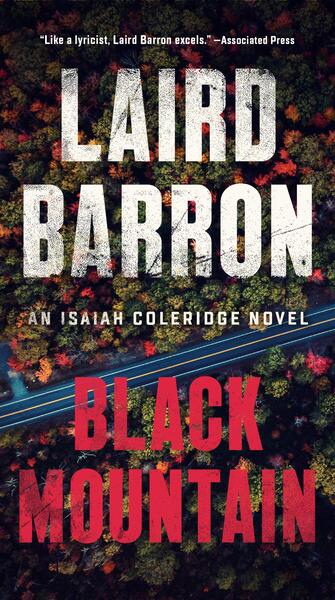 |
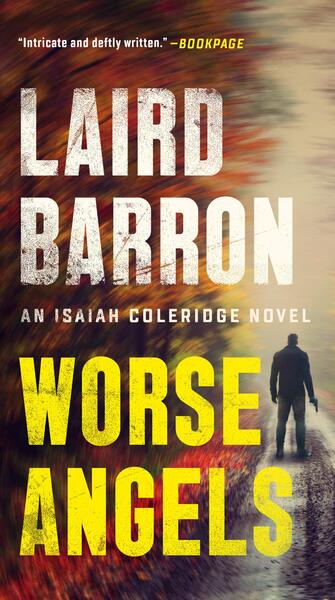 |
The Isaiah Coleridge novels: Blood Standard, Black Mountain and
Worse Angels (G.P. Putnam’s Sons paperback editions, 2019 – 2021)
When Blood Standard first came out, some naysayers worried that Barron was leaving his horror roots behind. But for many of his fans, myself included, the change from straight horror to hardboiled detective stories was not a huge shift. Barron had plenty of tough guy, noir-style characters throughout many of his horror stories. And, after reading Blood Standard, it was clear that this Isaiah Coleridge series was going to have a horror edge.
I found 2018’s Blood Standard to be superb, as well as the successive Black Mountain (2019) and Worse Angels (2020). In fact, as the series continued, Barron’s penchant for horror came more and more to the surface. Whereas in Blood Standard supernatural horror was hinted at, by Worse Angels the supernatural horror was quite explicit.
I think the whole Isaiah Coleridge series has been marvelous. Gritty detective meat with some Barron-style cosmic horror spritzed in for good measure. What a great combo! But as 2021 and 2022 rolled by, it seemed that Putnam was not interested in publishing any more than those three novels.
But thanks to Doug Murano and his Bad Hand Books, the fourth Isaiah Coleridge novel has now been published: The Wind Began to Howl (2023). (Where I got my signed early copy!) Though a bit shorter than the first three Coleridge novels, this one still packs the punch that I have come to expect from this character and his detective adventures.
As noted, Isaiah Coleridge is a former mob enforcer who has “gone straight” by starting a private detective agency in upstate New York. Sometimes Coleridge is more a bumbler than a true detective. But Coleridge is also no mere meathead. He’s clearly sharp — quoting a panoply of ancient to modern authors. But his attitude and his former reputation tend to get him in more trouble than he wants, often with him heading to the local emergency room for various injuries. As Coleridge describes in the newest novel:
The sole fly in the ointment? I’d lost a step, my bones ached when the weather changed, and I suffered occasional perceptual glitches, presumably a result of one too many knocks in the head. Oh, and recurring nightmares. Technicolor surround sound variety. Thus, flies in the ointment was more accurate (p. 15).
Coleridge is a very fleshed out character. Though not afraid of giving or receiving violence, Isaiah’s softer side comes out in his interactions with his girlfriend Meg, her son Devlin, and his dog Minerva. Coleridge also has a fairly funny sidekick, Lionel, a former sharpshooter marine and current farmhand at a local hippie farm.
In the new novel The Wind Began to Howl, Coleridge is contacted by an old-time mobster, one Marion Curtis, for which Coleridge claims: “We were frenemies, as the kids say” (p. 18). But Curtis seeks to employ Coleridge for a legitimate detective case. It seems that Curtis is financially backing a new film — with the same name as our novel — that seems to have run into a “snafu” that needs clearing up.
Coleridge takes this mysterious case by following up with one Gil Finlay, the director of “snafu-ed” movie The Wind Began to Howl. Turns out that Finlay needs permission to use a track in his movie from an outré band called The Barnhouse Effect, made up of two brothers, last name Barnhouse. Sounds like a legal thing. My people call your people, right? But that’s exactly the problem, claims Finlay. The Barnhouse brothers have disappeared. No one has seen or heard from them in three months.
Coleridge takes the case. It’s simply tracking down some missing persons, correct? But, as with most of Coleridge’s cases, things begin to get squirrelly pretty quickly. Strange characters and even stranger circumstances arise as Coleridge and his sidekick Lionel try tracking down the cult-like Barnhouse brothers.
I won’t spoil beyond that. But I want to highlight Barron’s excellent hard-boiled dialogue. If you’re familiar with authors like Raymond Chandler or Elmore Leonard, Barron is right there with this quick-witted interchanges, often edged with menace, and/or humor. Check out this cheeky exchange when Coleridge seeks out a contact who claims to be a soothsayer:
“Isaiah Coleridge. Detective. Your aura is wrong. For some reason, I figured you were lying to the cops.”
“Only when necessary.”
“Well, detective. Rye or bourbon?”
“Rye.”
She fetched a bottle of Old Forester and poured two glasses.
“Not to tell you your business or anything, but a doctor might want to check you for a concussion.”
“Nothing a fistful of Vicodin won’t remedy.” My nose had already swollen. Deep, abiding pain set in.
She disappeared and returned with a few extra-strength aspirin.
I swallowed them with the whiskey, counting loose teeth (p. 90).
But Barron’s flair is even more apparent with his fine-honed horror chops. For example, he can turn a seemingly normal, everyday scene into something incredibly eerie. After Coleridge changes a flat tire on his truck, out in the middle of nowhere, we get the following:
Across the road, amorphous forms solidified right at the edge of the truck’s headlight range. Several deer gathered upslope of the ditch. Frozen, glinting eyes fixed upon me. Reminiscent of a medieval tapestry. I wondered if they were real or the ghosts of animals killed by rocketing trucks like mine. Had they gathered to honor my heroic efforts in swerving around a member of the herd? Didn’t feel like it. Felt ominous (p. 30).
And though primarily a horror writer, Barron can dish out the humor too in the midst of scary:
Lionel pulled aside jags of sheetrock and filthy blanket to reveal a metal sarcophagus propped against the wall. The metal casket was balanced upright, its front panel fashioned as a leering demonic visage. A rusted lever jutted from the side. Of course, sarcophagus and coffin were the wrong words.
“This what I think it is?” he said.
“Replica iron maiden.” I conjured the image of a bed of nails, tiny holes to vent the blood. Odd, albeit the sort of prop one could plausibly expect of a cult rock duo or their bizzarro producer.
“A bit on the nose considering the venue.” He lit a cigarette. “Man, I hate to say it. Can’t be a body inside. Right. . . ?”
“Iron maidens weren’t used in torture. A dumbass myth…”
“Terror flics were bullshitting me since I was a little kid glued to Vincent Price’s every move?”
“Afraid so…”
“Horror comics lied?” (pgs. 167–168)
But the Coleridge novels also show a lot of humanity as well. One of the more touching scenes in the whole series appears toward the end of The Wind Began to Howl. In short, the horrific evil has just been met, if not defeated, by Coleridge. Later at home with his girlfriend Meg, we see the following:
Around midnight I crawled out of the covers, went into Devlin’s room and lay on the floor, weeping. Minerva climbed on top of my aching chest and clung. I clung right back.
“I can’t do this anymore.” Was it a vow or a plea? Was it even me talking to the ghosts, the angels, the dread undertaker Whiro grinning between cracks in the earth? (p. 185)
The Wind Began to Howl is a fun hardboiled ride. It hits familiar hardboiled beats while sprinkling in some classic Barron horror for us die-hards. If you haven’t read any of the Isaiah Coleridge novels, treat yourself. They don’t have to be read in order. Each is a standalone pleasure. I highly recommend the newest installment, The Wind Began to Howl. But don’t miss Blood Standard (2018), Black Mountain (2019) and Worse Angels (2020) either.
The Wind Began to Howl was published by Bad Hand Books (2023). It is 192 pages, priced at $12.99 at Amazon and $3.99 for the ebook, direct from the publisher.
I think the Isaiah Coleridge series is what the Jack Reacher series would be if Lee Child had actual talent.
I probably just angered a lot of people.
But the Coleridge series is very well written. Coleridge is an interesting character and the prose is wonderful. There is still the horror atmosphere to certain parts of this series.
I don’t have a interest in the Reacher series so I can’t comment. But I clearly agree about your comment about the Coleridge series being well written. My sense is that the horror elements may have hurt Barron’s Putnam deal in the long run. I don’t get the sense that the detective/hard crime crowd is interested in that spilling over into their genre. For my part, I love that Barron brings those two tropes together.
Me too.
I adore Barron. Rode his health crisis earlier this year with a great deal of trepidation, but thankful he pulled through and is on the road to recovery. His horror writing is just about without peer – along with Ramsey Campbell, he’s up there as the best in the business.
His turn to hard boiled noir was unsurprising, as his earlier work is suffused with elements of the genre. I too enjoyed the first three Coleridge books. I also enjoyed, to a slightly lesser extent, this novella. I think it faltered in a couple of places, and perhaps I needed it to be novel length to allow me to dive even deeper into it.
But that aside, this is a superior piece of fiction, and I applaud Bad Hand Books for taking Barron, and Coleridge, on. High recommendation – go out and buy and support a small press, and a great writer.
Hear, hear! Barron deserves all the love thrown his way. Thanks for the comment.